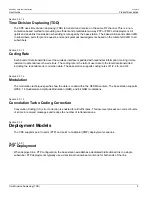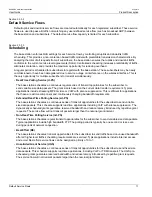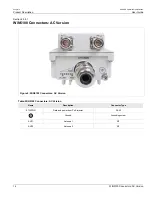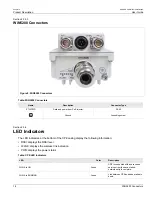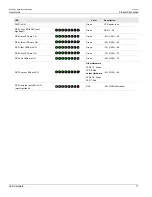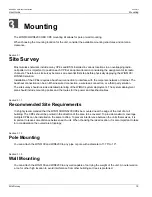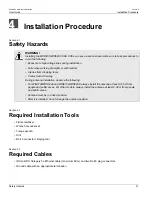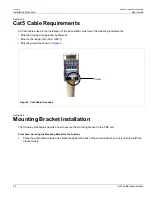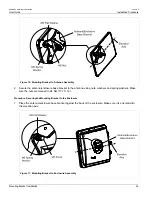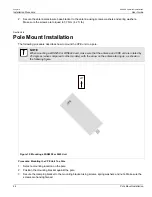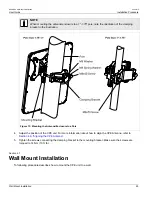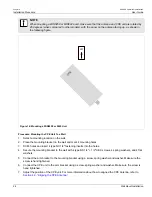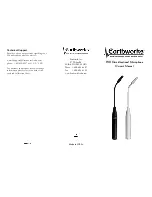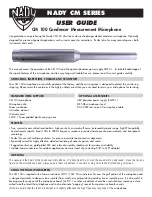
RUGGEDCOM WiN5100/WiN5200
User Guide
Chapter 2
Product Description
Default Service Flows
11
Section 2.3.3.2
Default Service Flows
Default uplink and downlink service flows are created automatically for each registered subscriber. These service
flows are used to pass all traffic not matching any user-defined service flow (such as broadcast ARP) between
the base station and subscribers. The default service flow capacity is limited for each subscriber.
Section 2.3.3.3
Scheduling
The base station enforces QoS settings for each service flow by controlling all uplink and downlink traffic
scheduling. This provides a non-contention based traffic model with predictable transmission characteristics. By
analyzing the total of all requests from all subscribers, the base station ensures that uplink and downlink traffic
conforms to the current service level agreements (SLAs). Centralized scheduling increases predictability of traffic,
eliminates contention, and provides the maximum opportunity for reducing overhead.
A regular period is scheduled for subscribers to register with the base station. These subscribers may be newly
commissioned or have been deregistered due to service outage or interference on the wireless interface. This is
the only opportunity for multiple subscribers to transmit simultaneously.
•
Real-Time Polling Service (rt-PS)
The base station schedules a continuous regular series of transmit opportunities for the subscriber to
send variable size data packets. The grant size is based on the current data transfer requirement. Typical
applications include streaming MPEG video or VOIP with silence suppression. This is efficient for applications
that have a real-time component and continuously changing bandwidth requirements.
•
Extended Real-Time Polling Service (ert-PS)
The base station schedules a continuous series of transmit opportunities for the subscriber to send variable
size data packets. This schedule supports real-time applications including VoIP with silence suppression. The
dynamically scheduled grants guarantee reserved bandwidth and reduce latency introduced by repetitive grant
requests. The service flow will not transmit packets larger than the nominal grant interval.
•
Non-Real-Time Polling Service (nrt-PS)
The base station schedules regular transmit opportunities for the subscriber to send variable size data packets.
Typical applications include high bandwidth FTP. The polling period is typically be one second or less, even
during periods of network congestion.
•
Best Effort (BE)
The base station schedules transmit opportunities for the subscriber to send traffic based on unused bandwidth
after all higher level traffic scheduling requirements are serviced. Typical applications include Internet access
and email. Best effort service flows can be assigned a priority of 0 to 7.
•
Unsolicited Grant Service (UGS)
The base station schedules a continuous series of transmit opportunities for the subscriber to send fixed size
data packets. This schedule supports real-time applications, including VoIP or TDM transport. The UGS pre-
scheduled grants guarantee reserved bandwidth and reduce latency introduced by repetitive grant requests.
The service flow will not transmit packets larger than the nominal grant interval.
Summary of Contents for RUGGEDCOM WiN5100
Page 2: ...RUGGEDCOM WiN5100 WiN5200 User Guide ii ...
Page 8: ...RUGGEDCOM WiN5100 WiN5200 User Guide FCC Statement And Cautions viii ...
Page 26: ...RUGGEDCOM WiN5100 WiN5200 User Guide Chapter 2 Product Description LED Indicators 18 ...
Page 28: ...RUGGEDCOM WiN5100 WiN5200 User Guide Chapter 3 Mounting Wall Mounting 20 ...
Page 106: ...RUGGEDCOM WiN5100 WiN5200 User Guide Appendix A WiN5100 WiN5200 Specifications 98 ...
Page 114: ...RUGGEDCOM WiN5100 WiN5200 User Guide Appendix D RUGGEDCOM CPE Warranty 106 ...













